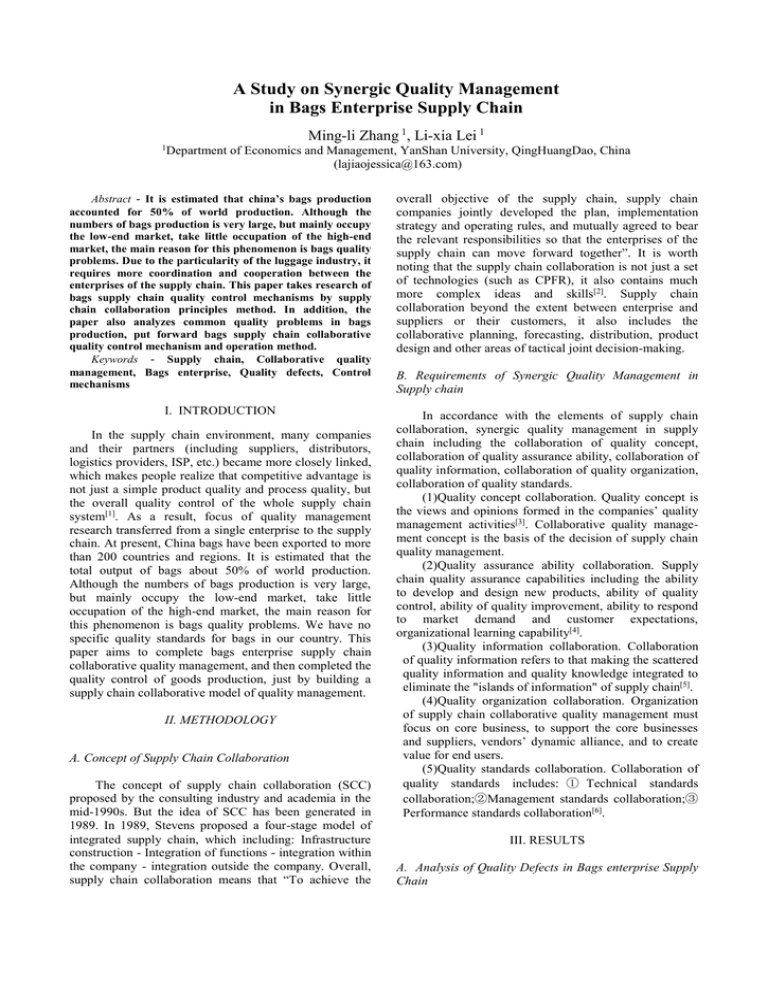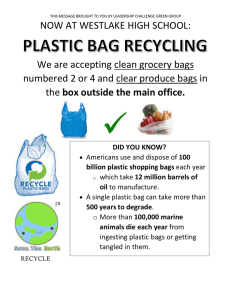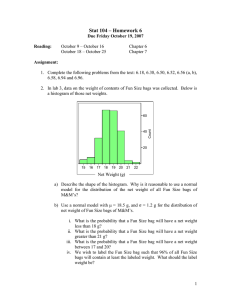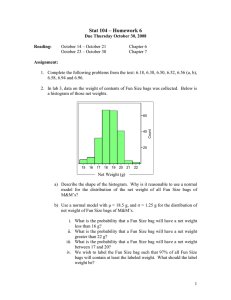- overall objective of the supply ...
advertisement

A Study on Synergic Quality Management in Bags Enterprise Supply Chain Ming-li Zhang 1, Li-xia Lei 1 1 Department of Economics and Management, YanShan University, QingHuangDao, China (lajiaojessica@163.com) Abstract - It is estimated that china’s bags production accounted for 50% of world production. Although the numbers of bags production is very large, but mainly occupy the low-end market, take little occupation of the high-end market, the main reason for this phenomenon is bags quality problems. Due to the particularity of the luggage industry, it requires more coordination and cooperation between the enterprises of the supply chain. This paper takes research of bags supply chain quality control mechanisms by supply chain collaboration principles method. In addition, the paper also analyzes common quality problems in bags production, put forward bags supply chain collaborative quality control mechanism and operation method. Keywords - Supply chain, Collaborative quality management, Bags enterprise, Quality defects, Control mechanisms I. INTRODUCTION In the supply chain environment, many companies and their partners (including suppliers, distributors, logistics providers, ISP, etc.) became more closely linked, which makes people realize that competitive advantage is not just a simple product quality and process quality, but the overall quality control of the whole supply chain system[1]. As a result, focus of quality management research transferred from a single enterprise to the supply chain. At present, China bags have been exported to more than 200 countries and regions. It is estimated that the total output of bags about 50% of world production. Although the numbers of bags production is very large, but mainly occupy the low-end market, take little occupation of the high-end market, the main reason for this phenomenon is bags quality problems. We have no specific quality standards for bags in our country. This paper aims to complete bags enterprise supply chain collaborative quality management, and then completed the quality control of goods production, just by building a supply chain collaborative model of quality management. II. METHODOLOGY A. Concept of Supply Chain Collaboration The concept of supply chain collaboration (SCC) proposed by the consulting industry and academia in the mid-1990s. But the idea of SCC has been generated in 1989. In 1989, Stevens proposed a four-stage model of integrated supply chain, which including: Infrastructure construction - Integration of functions - integration within the company - integration outside the company. Overall, supply chain collaboration means that “To achieve the overall objective of the supply chain, supply chain companies jointly developed the plan, implementation strategy and operating rules, and mutually agreed to bear the relevant responsibilities so that the enterprises of the supply chain can move forward together”. It is worth noting that the supply chain collaboration is not just a set of technologies (such as CPFR), it also contains much more complex ideas and skills[2]. Supply chain collaboration beyond the extent between enterprise and suppliers or their customers, it also includes the collaborative planning, forecasting, distribution, product design and other areas of tactical joint decision-making. B. Requirements of Synergic Quality Management in Supply chain In accordance with the elements of supply chain collaboration, synergic quality management in supply chain including the collaboration of quality concept, collaboration of quality assurance ability, collaboration of quality information, collaboration of quality organization, collaboration of quality standards. (1)Quality concept collaboration. Quality concept is the views and opinions formed in the companies’ quality management activities[3]. Collaborative quality management concept is the basis of the decision of supply chain quality management. (2)Quality assurance ability collaboration. Supply chain quality assurance capabilities including the ability to develop and design new products, ability of quality control, ability of quality improvement, ability to respond to market demand and customer expectations, organizational learning capability[4]. (3)Quality information collaboration. Collaboration of quality information refers to that making the scattered quality information and quality knowledge integrated to eliminate the "islands of information" of supply chain[5]. (4)Quality organization collaboration. Organization of supply chain collaborative quality management must focus on core business, to support the core businesses and suppliers, vendors’ dynamic alliance, and to create value for end users. (5)Quality standards collaboration. Collaboration of quality standards includes: ① Technical standards collaboration;②Management standards collaboration;③ Performance standards collaboration[6]. III. RESULTS A. Analysis of Quality Defects in Bags enterprise Supply Chain In accordance with the luggage industry terminology, as well as the industry's long-term conventional concept of the quality defects,defects of bags products can be summarized from the product design, materials accessories, technical operation, sewing, assembly ways. Quality Defects in bags enterprise supply chain include the following aspects: (1) Bags quality defects caused by material defects. ①Fabric defects. Fabric defects including scratch fabric, the fabric material information is not true, the fabric lining of non-compliance. ②Hardware material defects. Hardware material defects includes Hardware injured, hardware uneven color, hardware scratches, hardware burnt metal pinholes, hardware plating, the appearance of a pinhole-like pits, metal parts from leather, foam coating, leakage plating, oxidation spots. ③ Other accessories quality defects, such as lines, machines and other issues (2)Bags quality defects caused by unreasonable operation. ①Defects on the appearance and operation: Poor shape, the structure is irrational, package is not correct, the length dimensions out of tolerance, the product weight exceeds the standard specified target, box suture gap deformation box, ox collapse, uneven surface. ②Defects on the metal parts and assembly: Asymmetric accessories, accessories loose, box lock failure, bubble nails falling from the bags wheels falling down from the bags, wheels damaged, the zipper is missing the chain teeth, the zipper pull together the non-smooth standard; Non-standard operations: Jumper off the assembly line , not straight stitch, stitch length is too large, exposed thread, left edging blank, dental sub-line exposure, poor corrosion resistance, zipper flat tensile strength. B. Synergic Quality Management Model in bags enterprise Supply Chain According to the problems of bags enterprise supply chain quality control, Synergic quality management model in bags enterprise supply chain should include the following characteristics: (1)Use agent technology to improve the system's intelligence, applicability. This system is a collection of multi-Agent, including the plan agent, coordinating agent, sales agent, purchasing agent, producing agent, inventory agent, financial agent[7]. (2) Providing the optimization and decision support, and building partnerships with upstream and downstream enterprises to achieve information sharing and business integration, to achieve synergistic operation[8]. This model require to cover all the key supply chain processes, including the master production schedule(MPS), Material Requirements Planning (MRP), the procurement plan, subcontractor plans. In accordance with the above requirements, proposed synergic quality management model in bags enterprise supply chain shown in figure 1. Suppliers Supplier Collaborative decisioncustomer quality making quality manage- Collaborative Forecasting feedback ment Collaborative production platform arrangements platform Upstream customers downstream Integration Information Financial system system Coordination and decision Foreign trade system Other systems Fig. 1. Synergic quality management model in bags enterprise supply chain During the model operation, you need to pay attention to the following aspects: (1) WWW Service WWW service for the supply chain is a typical threetier structure, divided into customer service, supplier service two modules, allowing customers and suppliers to have access to supply chain system through the Internet, including registration, order generation, tracking orders for the implementation of the situation and forecasting information maintenance, and inventory information[9]. (2) System Management System management subsystem used to maintain the system operation parameters and the underlying data set forecast parameters, customers / suppliers / institutions / warehouse / materials / personnel information such as password management, workflow process, which uses typical C / S structure[10]. (3) Task Execution Management Task execution management includes storage task execution and inventory management, payment and collection of task execution and financial management, production task execution and production management, purchasing task execution and procurement management. It is also typical C / S structure. (4) Coordination and Decision Center Coordination and decision center includes the plan agent, coordinating agent, sales agent, purchasing agent, producing agent, inventory agent, and financial agent composed of orders (sales orders, purchase orders). C. Other Recommendations (1)Core enterprise should be more stronger and excellent: Building supply chain management capacity Core enterprise plays an important role in mutualism supply chain, it is the organizers and managers of the supply chain, it is also a supply chain innovator in collaborative system change, planners, promoters[11]. Therefore, we should vigorously develop the core enterprise in bags industry. To focus on the cultivation of core competitiveness, make the core enterprise become stronger and excellent. Core enterprise should focus on supply chain management, capacity building, so that enterprises can be armed with a powerful resource strength, market influence, coordination and management ability, social responsibility and innovative ability. It also includes a strong quality control capabilities and some market influence. Ultimately, the core enterprise supply chain management needs to promote the development of associated companies, to develop a symbiotic relationship with the affiliated companies, to ensure the quality control capabilities of the entire supply chain. (2) Technical support of supply chain collaboration: technology standardization of the bags production At present, Standardized production technology of bags products, which can be seen as an important technical support foe the enterprises and their suppliers to carry out supply chain collaboration, and it also can be seen as an important driving force for supply chain collaboration. First, Standardized production technology of bags products encourage more suppliers to participate in quality management of the supply chain collaboration. Standardized production technology provide suppliers for simple, easy to learn, operational bags production technology and operating procedures, which will make suppliers providers luggage materials that meet market quality requirements. These measures will help overcome the short-term difficult in bags quality barriers. Now we facing the situation that a large number of bags material supplied every year, but the quality are generally low. It is necessary for guiding the suppliers actively involved in the supply chain collaboration to produce bags products with higher-quality. During these processes, we should take technology standardization of the bags production as the measures, Use the role of the core enterprise and supplier of specialized cooperative organizations well. At the same time, we should build organizational forms like "Core business + bags suppliers + standardized production base" and make it an effective vehicle for the development of the luggage industry standardized production. IV. DISCUSSION It can be seen from the paper's findings that you should pay attention to the following aspects when you implement the bags enterprise supply chain collaborative quality control mechanism: (1)Bags supply chain quality problems mainly come from Suppliers’ product defects, non-standard production process and problems of physical and chemical properties. (2) During the operation of synergic quality management model in bags enterprise supply chain, bags enterprise need to deal with WWW Service, System Management, Task Execution Management; Coordination and Decision Center. (3)In order to improve supply chain collaborative quality control. Bags industrial clusters should build supply chain management capacity and provide technical support of supply chain collaboration. V. CONCLUSION Supply chain system’s integrity and efficiency related to the level of the competitiveness of enterprises. Synergic quality management model in bags enterprise supply chain solve the existing problems in the quality control of bags business supply chain, and effectively integrate the procurement, sales, internal management. This paper use the idea of collaborative supply chain management to reorganization the company’s internal production and management processes and provide efficient service to customers, which will make the bags companies directly facing the Business Process Management and improve the ability of providing service. This paper put forward bags supply chain collaborative quality control mechanism and operation method, which will be useful for improving the quality control of the bags enterprise supply chain. REFERENCES [1] Samuel H. Huang Sunil K. Computer-assisted supply chain configuration based on supply chain operations reference (SCOR) model .Computers and Industrial Engineering, 2005, 48 (2):377-394 . [2] Carol J. Robinson, Manoj K. Malhotra. Defining the concept of supply chain quality management and its relevance to academic and industrial practice[J] .International Journal of Production Economics, 2005, 96 :315-337 . [3] Keah Choon Tan. A framework of supply chain management literature .European Journal of Purchasing & Supply Management, 2001:39-48 . [4] Posenblatt, M. J, Lee, H. L. Economic production cycles with imperfect production process .IIE Transactions, 1986, (18):48-55 . [5] Darrick Pagel. Management for optimal performance though effective coordination of the supply chain .Production and Inventory Management Journal, 1999, (1):66-70 . [6] Bowon K. Coordination an innovation in supply chain management .European Journal of Operational Research, 2000, 123(3) :568-584 . [7] Cheng T. EPQ with process capability and quality assurance considerations .Journal of Operational Research Society, 1991, 42(4) :713~720. [8] Lal R, Staelin R. An approach for developing an optimal discount pricing policy .Management Science, 1984, 30(12):1524-1539. [9] Kohli R, Park H. A cooperative game theory model of quantity discounts .Management Science, 1989, 35:693-707 . [10] Starbird S. The effect of acceptance sampling and risk aversion on the quality delivered by suppliers .Journal of Operational Research Society, 1994, 45(2) :309-320 . [11] Wei Shi Lira. Producer-supplier contracts with incomplete information .Management Science, 2001, 47(5) :709~715 .






